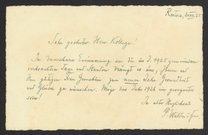Letter from Paul Walden to Georg Bredig, March 1901
- 1901-Mar-21

Rights
Download all 2 images
PDFZIPof full-sized JPGsDownload selected image
Small JPG1200 x 1832px — 286 KBLarge JPG2880 x 4396px — 1.4 MBFull-sized JPG3618 x 5522px — 2.1 MBOriginal fileTIFF — 3618 x 5522px — 57.2 MBLetter from Paul Walden (1863-1957) to Georg Bredig (1868-1944). Walden was a chemist who is known for creating the stereochemical reaction the "Walden inversion". From 1892-1919 Walden was a faculty member at Riga Polytechnic University. In 1919 he left his position possibly due to World War I and its effects on Latvia.
| Property | Value |
|---|---|
| Author | |
| Addressee | |
| Place of creation | |
| Format | |
| Genre | |
| Extent |
|
| Language | |
| Subject | |
| Rights | In Copyright - Rights-holder(s) Unlocatable or Unidentifiable |
| Credit line |
|
| Additional credit |
|
| Digitization funder |
|
Institutional location
| Department | |
|---|---|
| Collection | |
| Series arrangement |
|
| Physical container |
|
View collection guide View in library catalog
Related Items
-
Letter from Paul Walden to Georg Bredig, October 19121912-Oct-27 – 1912-Nov-09
Cite as
Walden, Paul. “Letter from Paul Walden to Georg Bredig, March 1901,” March 21, 1901. Papers of Georg and Max Bredig, Box 2, Folder 64. Science History Institute. Philadelphia. https://digital.sciencehistory.org/works/kwl9oa7.
This citation is automatically generated and may contain errors.
Image 1
[Cyrillic script]
Riga, 21 März 1901.
Sehr geehrter Herr College,
Ich bitte Sie herzlich, um Nachricht, wenn ich erst jetzt auf Ihren wortlosen, aber am so inhaltsreichen Beweis Ihres freundlichen Gedenkens meiner Person reagiere: der altwissende Telegraph wird Ihnen ja alle unmöglichen und – daneben – auch wirklichen Dinge über die akademischen Vorkommnisse der letzten Monate berichten haben, Vorkommnisse, welche alle Hochschulen Russlands gleichmässig betreffen, und das akademische Leben vollkommen vergiften haben.
Zu Ihrer Arbeit „anorganische Fermente“, meinerseits etwas lobenswertes zu sagen,
Image 2
ist gewiss überflüssig: Sie kennen ja schon zur Genüge meinen Respekt vor Ihren Leistungen und meine Gefühle zu Ihnen als Kollegen, wisse ja dass ich Ihnen ja längst darob gepresst habe, warum sie nicht zur Habilitation schreiten – können daher meine aufrichtige Freude sich ausmalen, als ich Ihr Werke anfing, können in Gedanken meinen Ausruf vernehmen: Na endlich!
Empfangen Sie daher meinen herzlichen Händedruck und aufrichtigen Glückwunsch zu Ihrer Arbeit und nicht minder als zu Ihrer Habilitation!
Es würde mich sehr erfreuen, wenn Sie Zeit fänden, mich in ein paar Zeilen zu informieren,
[page 3]
wie die akademischen Dinge denn eigentlich sich gestattet haben: Meister Ostwald erzählte mir von allerlei beabsichtigten Aenderungen in seiner Thätigkeit und in seinen Beziehungen zum Laboratorium, was mir nicht ganz verständlich, nicht ganz übersichtlich und nicht – nun sagen wir – zweckentsprechend erschien. Ist davon schon Etliches verwirklicht und wie haben sich die Feldherren Alexander des Grossen in seinem Westreich getheilt?
Herzinnigen Gruss und Glückauf!
Ihr ergebenster
P. Walden
Image 1
[Cyrillic script]
Riga, 21 March 1901
Dear Colleague,
Please let me know how you are doing, although I am now just responding to your most recent correspondence, which was rich in substance, but lacking in personal news. The omniscient telegraph will inform you about the preposterous, albeit actual academic events of the last few months that have equally impacted all universities in Russia and completely poisoned academic life.
With regards to your thesis, “Inorganic Fermentation”, I would like to express my praise.
Image 2
Although this is certainly unnecessary. You are already aware of my respect for your achievements and my feelings towards you as a colleague. You also know that I have asked you vehemently for a long time why you have not pursued a habilitation. When I read your thesis, you can thus imagine my sincere joy and exclamation: At last!
I shake your hand warmly and offer you my sincere congratulations on your thesis and habilitation!
I would be very pleased if you could find the time to briefly update me.
[page 3]
How did the academic situation turn out? Ostwald told me about many changes in his career and at his laboratory. They did not seem entirely logical, coherent, or appropriate. Has this already happened and how did the generals in Alexander the Great’s Western Empire split up?
Warm regards and good luck!
Sincerely,
P. Walden






